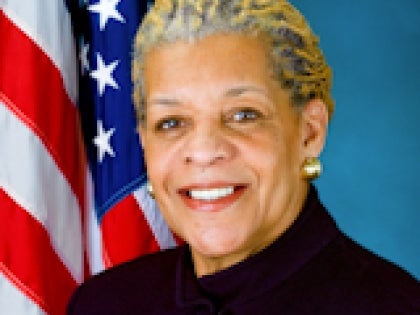
Senator Hassell-Thompson Says More Needs To Be Done To Implement Help America Vote Act (HAVA) In New York
State Senator Ruth Hassell-Thompson (D-Bronx/Westchester) today called on the State Board of Elections and the U.S. Department of Justice to work together in implementing the Help America Vote Act (HAVA) law in New York State as quickly as possible. The issue of full and timely implementation of HAVA is currently in front of a federal judge overseeing a lawsuit filed by the Department.
While the judge recently issued an order that accepted a compromise plan between the State and the Justice Department, Senator Hassell-Thompson said there is a long way to go before New Yorkers can be fully confident in the fact that each vote will be tallied in a fair manner.
"The future of our democracy lies in the ability to hold fair elections," Senator Hassell-Thompson said. "The whole premise of HAVA is to ensure that every vote counts, and I am deeply disappointed that New York has moved so slowly in its implementation."
HAVA was enacted after the 2000 Presidential Election and subsequent recount of the vote in Florida. Among its provisions are that boards must assign unique identifiers to all voters, and those voting for the first time; that people who registered by mail must produce identification at the polls; that a statewide, interactive and computerized voter registration database be created; and that voting systems allow all voters, even those with disabilities, to vote privately.
"New York was the last state to come into compliance with HAVA, in part because of the debate over the use of optical scan machines, or touch screen voting machines," Senator Hassell-Thompson said.
Senator Hassell-Thompson raised concerns about HAVA not being fully implemented in time for this year’s elections. She is particularly troubled that the needs of many disabled voters will not be met.
"It is obvious that New York’s voting technology has not kept up with the times. As we try to become more open and accessible to those with disabilities, it is insulting to continue using old lever machines, many of which the disabled cannot operate. When someone has to rely on a volunteer for help, that vote is no longer private," Senator Hassell-Thompson said.
For now, counties will place a limited number of handicap accessible ballot marking devices throughout select locations in time for use in the September primary. The New York City Board of Elections will establish five handicap accessible "vote centers," one for each borough, with several new machines at each location.
The Bronx/Westchester lawmaker noted that while this is a start, she hopes that an acceptable plan will be in effect for continued implementation next year. Senator Hassell-Thompson also said that this year’s compromise may cause fiscal problems for counties.
"The money to pay for these disabled accessible machines will come out of each county’s federal HAVA allotment. That means some counties might not have enough money left over to purchase machines for next year, when the State is scheduled to be in full compliance. Again, this speaks to the dysfunction of the entire process," Senator Hassell-Thompson said.



